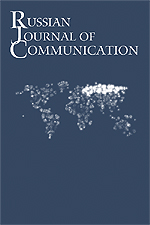Elena Nuciforo, Visiting Instructor in Communication Arts, is the author of “Russian Folk Discourse on Problem Drinking,” appearing in the Russian Journal of Communication. Professor Nuciforo’s article explores how problem drinking is defined in the Russian folk discourse. Nuciforo uses cultural discourse analysis to explore two key terms, “to drink” and “to get drunk,” and their clusters. Both key terms indicate significant devastation and problems from a public health perspective, since Russian society has long suffered from the detrimental effects of alcohol consumption. In the folk discourse, these two ways of problem drinking differ in their influence on people’s personality, relations, behavior, emotions, and their location in the nature of things.
The Journal of Russian Communication is a peer-reviewed scientific journal that publishes theoretical and empirical papers and essays and books reviews that advance an understanding of communication in, with, and about Russia. The journal welcomes original theoretical, empirical, critical, comparative, and historical studies and is open to all methodological perspectives. The journal is published in cooperation with the Russian Communication Association (RCA) and the North American Russian Communication Association (NARCA).
Elena V. Nuciforo earned her PhD in communication from the University of Massachusetts. She also holds a Master of Education degree from the Center for International Education at UMass Amherst and a higher education diploma in teaching English as a foreign language from Buryat State University in Ulan-Ude, Russia. Dr. Nuciforo’s research focuses on social interaction, Russian culture and communication, and health communication. Her dissertation was devoted to cultural discourse analysis of Russian alcohol consumption and its symbolic construction among Russian people, in Russian public policy, and in Russian state-sponsored media. She is a native of Russia and has extensive experience working in international and intercultural environments, both in Russia and the USA.



